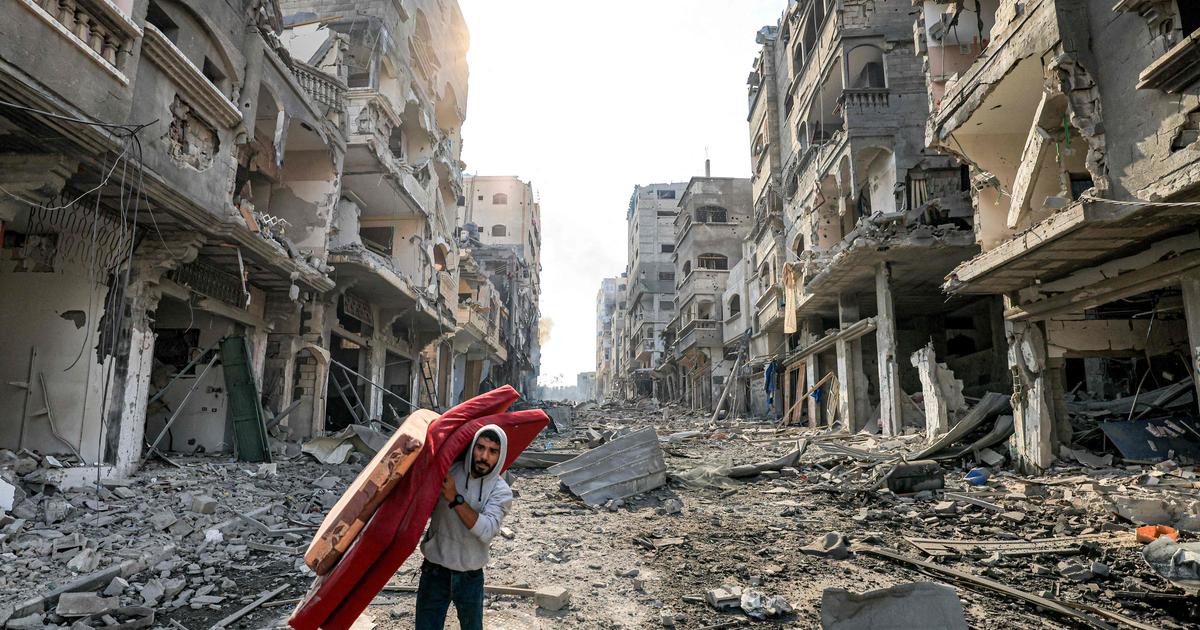Five days after the deadly attack unleashed by Hamas in Israel, more than 260,000 people have been forced to flee their homes in the Gaza Strip due to Israel's military response, according to the UN Office for the Coordination of Humanitarian Affairs (OCHA). Of these, more than 175,000 have taken refuge in UN schools. This is the largest displacement of people "since the 50-day escalation (during) hostilities in 2014," the agency said.
To discover
- LIVE - Response, death toll, political reactions: the aftermath of Hamas' offensive against Israel
«
This number is expected to rise further," the UN warned, as the Israeli government decreed on Monday the establishment of a complete siege of the Gaza Strip. "No electricity, no food, no gas ... We are fighting animals and we are acting accordingly," Defense Minister Yoav Gallant said. 2.3 million people live in this 41-kilometre-long and 6- to 12-kilometre-deep strip of land, which has been under Israeli blockade since 2007.
Read alsoHamas attack on Israel: Gaza Strip caught under a deluge of IDF bombs
The prospects for the population - 80% of whom are dependent on humanitarian aid - are catastrophic, warn aid associations and organizations. "The coming days are not going to be clean," IDF spokesman Lt. Col. Richard Hecht warned, referring to Israel's escalating counteroffensive. "The images of destruction in Gaza are just the beginning," Israeli Prime Minister Benjamin Netanyahu said. Since the Palestinian Islamist terror organization launched its offensive on Saturday, more than 7,1000 people have died, according to the Palestinian Health Ministry. Another 4,250 were injured.
Hospitals run out of narcotics
"We have never experienced such a situation in terms of intensity and scale," Sarah Château, head of the Palestinian programme for Médecins Sans Frontières (MSF), told Le Figaro. This morning, the shelling continues to hit very hard. Everyone is under pressure." For the time being, "pharmacy stocks are not affected by shortages," says the United Nations Relief and Works Agency for Palestine Refugees in the Near East (UNRWA).
But, Chateau adds, "Palestinian health ministry staff tell us that hospitals are running out of narcotics," which are needed to relieve patients during operations. "Our stocks will be empty in two to three days if the shelling is still as intense and the number of wounded as ever," she added. On the ground, "the humanitarians are only partially carrying out their mission," says Sarah Château. You can't move, or it's very difficult, every move is very risky." There is a real fear that hospitals will no longer be able to function because of power cuts and that the quality of care provided will be poorer.
'Limited' access to water
In some shelters, access to water is "limited," UNRWA adds. And the damage caused by Israel's response to water and sanitation facilities "has compromised the services provided to more than 400,000 people," said Stephane Dujarric, spokesman for the UN secretary-general. In a June 2022 report, Ochoa revealed that 78% of running water in Gaza is "unfit for human consumption".
At the same time, there is no food crisis. On Wednesday, UNRWA estimated that "nearly half a million people (112,000 families) have not been able to get their food rations" since its distribution centres closed. In a statement, the World Food Programme (WFP) said it was "deeply concerned" about the difficulties in accessing food in areas affected by the fighting, while the Gaza Strip produces only 10% of what it eats. The WFP is also worried about stock-outs in food stores as well as the mess caused by the power cuts that Israel is tightening – the Gaza Strip is 100% dependent on Israel for its electricity.
These cuts are not new. In 2022, Gazans had electricity for an average of only twelve hours a day, the UN reports. Today, "Gaza's power plant is now the only source of electricity and could run out of fuel within days," Dujarric added. Because it is fuel oil that enables the production of electricity - and de facto the operation of the water network. However, there is no longer any supply. Gasoline, too, will be in short supply: 91% of the oil and diesel used in the Gaza Strip comes from Egypt. The remaining 9% of Israel, according to the UN.
"You can't suffocate the population"
International medical NGOs warned yesterday about the health situation and called for a humanitarian corridor. "Nothing beats a ceasefire. We need to be able to secure a few spaces to keep our colleagues safe and set up humanitarian corridors to allow the supply of medicines and food," reaffirms Sarah Château. You can't suffocate the population."
In Cairo on Wednesday, UN officials in charge of the Palestinians discussed ways to "ensure access to humanitarian services and aid from the Gaza Strip" with Egypt. Through the Rafah crossing, the country holds the only opening to the world of the Palestinian enclave that is not controlled by Israel. The crossing was bombed three times by the Israelis on Monday and Tuesday.

